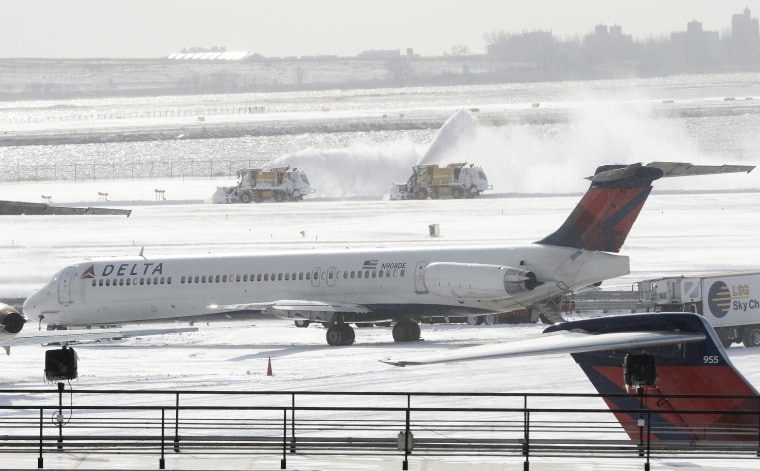/ Source: CNBC.com
Although U.S. airlines have taken a beating from a mass of weather-related cancellations this winter — and word of a new terror threat — the industry overall is healthier than it has been in years, analysts say.
"It's a blip, in a sense," Vaughn Cordle, a partner at Ionosphere Capital, said of the potential financial hit to the airline industry's bottom line.
It's hard to know if a small number of travelers will defer flying due to new intelligence about a potential shoe-bomb threat, given so many other factors to weigh, Cordle said. It would be a different story if an attack was successful. "If there is an event, that would have an impact and it would be sharp and powerful," he said.
"The reality is, I think we're looking at a healthy industry going forward."
The weather and its impact on the travel industry is a slightly different story.
From Dec. 1 through Feb. 18, there were 102,000 weather-related flight cancellations, according the masFlight tracking data.
Regional carrier ExpressJet has had the most cancellations so far this winter, with 11,658, according to FlightAware, another tracking service. American Eagle has been the second hardest hit with 11,235 cancellations from Dec. 1 through Feb. 20, according to the same FlightAware analysis. Other carriers racked up the cancellations: Southwest had 7,323; American, 6,954; United, 6,731; Delta, 6,253; Skywest, 4,760; US Air, 3,496; and JetBlue, 3,378.
Airlines could lose as much as $250 million to $500 from winter storms, Michael Boyd, The Boyd Group chairman, said in an interview on CNBC's "Squawk Box" earlier this month.
"The reality is, I think we're looking at a healthy industry going forward. This is going to have some impact on the first quarter," he said. "I think going forward there's a lot of good things happening in the airline industry, notwithstanding things like pilot issues and other things. I think it's going to be a strong year for the industry."
Jet fuel costs are not currently rising, but passenger demand is. Plus, airlines have been able to raise fees to help boost their bottom lines.
Cordle agreed that any short-term weather-related losses aren't likely to rattle institutional investors, who are more concerned about future cash flow. Plus, the cancellations come with an important side effect because they aren't burning fuel, which normally consumes about one-third of the cost to operate a flight, Cordle said.
Another unknown element is how many cancellations will be attributed to new rules that ensure pilots can get enough rest between flights.
"We won't know the specific effect the rule has had on the airlines' operations until they report their on-time performance figures," Katie Connell, a spokeswoman for the Airlines for America industry group, told CNBC in an email. "This is a time of transition as the rule was just recently implemented and we will continue to work closely with the FAA to identify specific issues related to the implementation of the rule and propose solutions in response."
In January, JetBlue cited the new pilot-fatigue rules as one cause for the cancellations amid multiple storms. "Even as airports began to reopen though, newly launched FAA regulations on pilot duty times caused delayed flights to quickly turn into canceled ones," the airline said in a statement.
